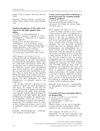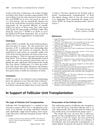 6 citations,
January 2020 in “The journal of investigative dermatology/Journal of investigative dermatology”
6 citations,
January 2020 in “The journal of investigative dermatology/Journal of investigative dermatology” New topical treatment using spherical nucleic acids shows promise in reducing psoriasis inflammation.
 6 citations,
September 2019 in “Archives of Dermatological Research”
6 citations,
September 2019 in “Archives of Dermatological Research” Found 32 genes linked to male baldness, affecting hair growth and stress-related pathways.
[object Object]  6 citations,
December 2017 in “Molecular Medicine Reports”
6 citations,
December 2017 in “Molecular Medicine Reports” Wnt5a may contribute to psoriasis by reducing skin cell growth, blocking skin cell maturation, and increasing inflammation.
 6 citations,
January 2015 in “Dermatology”
6 citations,
January 2015 in “Dermatology” Trichoscopy helps diagnose hair and scalp problems but isn't always definitive and should be used with other methods.
 6 citations,
November 2013 in “International Journal of Radiation Biology”
6 citations,
November 2013 in “International Journal of Radiation Biology” Gamma-rays exposure during the resting phase of hair growth can damage hair regeneration and color in mice.
 6 citations,
July 2011 in “Journal of Plastic Reconstructive and Aesthetic Surgery”
6 citations,
July 2011 in “Journal of Plastic Reconstructive and Aesthetic Surgery” Eyebrow reconstruction using hair follicle grafts was successful in a man with a benign hereditary disorder affecting his eyebrows.
 6 citations,
January 2009 in “Elsevier eBooks”
6 citations,
January 2009 in “Elsevier eBooks” The skin has multiple layers and cells, serves as a protective barrier, helps regulate temperature, enables sensation, affects appearance, and is involved in vitamin D synthesis.
 5 citations,
October 2014 in “Methods”
5 citations,
October 2014 in “Methods” The document explains how to create detailed biological pathways using genomic data and tools, with examples of hair and breast development.
 5 citations,
January 2013 in “Journal der Deutschen Dermatologischen Gesellschaft”
5 citations,
January 2013 in “Journal der Deutschen Dermatologischen Gesellschaft” The document concludes that individualized treatment for malignant epithelial tumors is necessary and more research on metastatic squamous cell carcinoma treatments is needed.
 5 citations,
October 2012 in “Expert Review of Dermatology”
5 citations,
October 2012 in “Expert Review of Dermatology” Trichoscopy is a useful tool for diagnosing hair and scalp diseases without needing skin biopsies.
 5 citations,
February 2009 in “International Journal of Cosmetic Science”
5 citations,
February 2009 in “International Journal of Cosmetic Science” Coenzyme Q10 helps reduce aging in human hair.
 5 citations,
May 2004 in “International Journal of Cosmetic Science”
5 citations,
May 2004 in “International Journal of Cosmetic Science” Versican is important for hair growth and could help find new hair regrowth treatments.
 4 citations,
January 2021 in “Postępy Dermatologii i Alergologii”
4 citations,
January 2021 in “Postępy Dermatologii i Alergologii” Hydroxychloroquine can help treat certain types of hair loss.
 4 citations,
December 2020 in “Mammalian genome”
4 citations,
December 2020 in “Mammalian genome” Harlequin mutant mice have hair loss due to low AIF protein levels and retroviral element activity.
 4 citations,
March 2019 in “Experimental Biology and Medicine”
4 citations,
March 2019 in “Experimental Biology and Medicine” Exposure to 50 Hz electromagnetic fields may help mice grow hair faster.
 4 citations,
December 2018 in “Macedonian Journal of Chemistry and Chemical Engineering”
4 citations,
December 2018 in “Macedonian Journal of Chemistry and Chemical Engineering” A new method accurately measures amino acids in treated hair, showing bleaching reduces amino acids while protein treatments increase them.
[object Object]  4 citations,
September 2017 in “Skin appendage disorders”
4 citations,
September 2017 in “Skin appendage disorders” The dog with an Alopecia Areata-like condition showed signs of an autoimmune disease and partially regrew hair without treatment, suggesting dogs could be models for human AA research.
 4 citations,
February 2017 in “Journal of Cutaneous Medicine and Surgery”
4 citations,
February 2017 in “Journal of Cutaneous Medicine and Surgery” Compounds from certain trees used by First Nations people show potential for treating skin conditions and promoting hair growth, but more research is needed to confirm their safety and effectiveness.
 4 citations,
January 2013 in “Humana Press eBooks”
4 citations,
January 2013 in “Humana Press eBooks” Scientists found ways to identify and collect skin stem cells, which vary by skin area and are delicate.
 4 citations,
October 2012 in “Expert Review of Dermatology”
4 citations,
October 2012 in “Expert Review of Dermatology” Dermoscopy greatly improves melanoma diagnosis and reduces unneeded surgeries.
 4 citations,
July 2012 in “Dermatologic Clinics”
4 citations,
July 2012 in “Dermatologic Clinics” New biopsy techniques and tools improve alopecia diagnosis, and both too much and too little selenium can cause hair loss.
 4 citations,
January 2012 in “Elsevier eBooks”
4 citations,
January 2012 in “Elsevier eBooks” The document concludes that various skin conditions have specific treatments, ranging from antihistamines for urticaria to surgery and medication for tumors and chronic skin diseases.
 4 citations,
March 2002 in “Journal of the American Pharmaceutical Association”
4 citations,
March 2002 in “Journal of the American Pharmaceutical Association” The conclusion is that pharmacists are important in helping women choose the right skin care treatments.
 4 citations,
February 2000 in “Dermatologic Surgery”
4 citations,
February 2000 in “Dermatologic Surgery” The document concludes that Follicular Unit Hair Transplantation is a more precise and effective method for hair restoration.
 3 citations,
October 2022 in “PloS one”
3 citations,
October 2022 in “PloS one” Scientists have developed a method to keep chicken feather follicles alive and structurally intact in a lab for up to a week.
 3 citations,
January 2017 in “Yonsei Medical Journal”
3 citations,
January 2017 in “Yonsei Medical Journal” Blocking 11β-HSD1 can lessen the harmful effects of glucocorticoids on hair growth cells.
 3 citations,
March 2016 in “Journal of Cosmetic Dermatology”
3 citations,
March 2016 in “Journal of Cosmetic Dermatology” GPIGS peptide increases thick hair growth in balding Japanese men.
 3 citations,
August 2013 in “Stem cells”
3 citations,
August 2013 in “Stem cells” Certain inhibitors applied to the skin can promote hair growth by maintaining a key hair growth signal.
 3 citations,
April 2011 in “Microscopy research and technique”
3 citations,
April 2011 in “Microscopy research and technique” Teratoma hair is similar to scalp hair but has a rougher surface and lower adhesive force.
 3 citations,
June 2004 in “Alternative and Complementary Therapies”
3 citations,
June 2004 in “Alternative and Complementary Therapies” The document concludes that hair loss is influenced by genetics and other factors, and while treatments like finasteride can help, they have limitations and side effects.






























